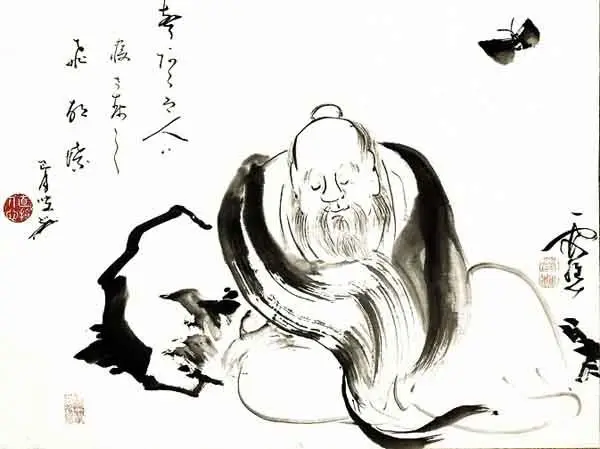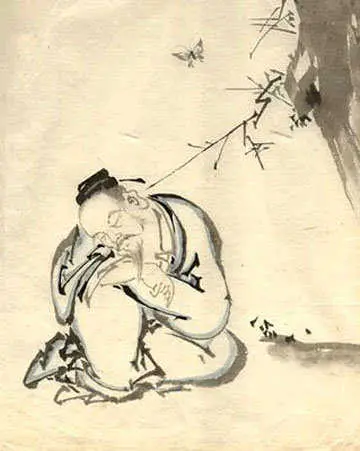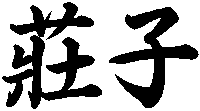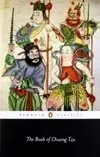Chuang Tzu 8

The Taoist Text, Chapter 8
Webbed Toes.
1. A ligament uniting the big toe with the other toes and an extra finger may be natural growths, but they are more than is good for use. Excrescences on the person and hanging tumours are growths from the body, but they are unnatural additions to it. There are many arts of benevolence and righteousness, and the exercise of them is distributed among the five viscera; but this is not the correct method according to the characteristics of the Tâo. Thus it is that the addition to the foot is but the attachment to it of so much useless flesh, and the addition to the hand is but the planting on it of a useless finger. (So it is that) the connecting (the virtues) with the five viscera renders, by excess or restraint, the action of benevolence and righteousness bad, and leads to many arts as in the employment of (great) powers of hearing or of vision.
The Book
The Taoism of Lao Tzu Explained. The great Taoist philosophy classic by Lao Tzu translated, and each of the 81 chapters extensively commented. Click the image to see the book at Amazon (paid link).
More about the book here.
|
2. Therefore an extraordinary power of vision leads to the confusion of the five colours and an excessive use of ornament. (Its possessor), in the resplendence of his green and yellow, white and black, black and green, will not stop till he has become a Lì Kû. An extraordinary power of hearing leads to a confusion of the five notes, and an excessive use of the six musical accords. (Its possessor), in bringing out the tones from the instruments of metal, stone, silk, and bamboo, aided by the Hwang-kung and Tâ-lü (tubes), will not stop till he has become a Shih Khwang. (So), excessive benevolence eagerly brings out virtues and restrains its (proper) nature, that (its possessor) may acquire a famous reputation, and cause all the organs and drums in the world to celebrate an unattainable condition; and he will not stop till he has become a Tsang (Shan) or a Shih (Tshiû). An extraordinary faculty in debating leads to the piling up of arguments like a builder with his bricks, or a netmaker with his string. (Its possessor) cunningly contrives his sentences and enjoys himself in discussing what hardness is and what whiteness is, where views agree and where they differ, and pressing on, though weary, with short steps, with (a multitude of) useless words to make good his opinion; nor will he stop till he has become a Yang (Kû) or Mo (Tì). But in all these cases the parties, with their redundant and divergent methods, do not proceed by that which is the correct path for all under the sky. That which is the perfectly correct path is not to lose the real character of the nature with which we are endowed. Hence the union (of parts) should not be considered redundance, nor their divergence superfluity; what is long should not be considered too long, nor what is short too short. A duck's legs, for instance, are short, but if we try to lengthen them, it occasions pain; and a crane's legs are long, but if we try to cut off a portion of them, it produces grief. Where a part is by nature long, we are not to amputate, or where it is by nature short, we are not to lengthen it. There is no occasion to try to remove any trouble that it may cause.
3. The presumption is that benevolence and righteousness are not constituents of humanity; for to how much anxiety does the exercise of them give rise! Moreover when another toe is united to the great toe, to divide the membrane makes you weep; and when there is an extra finger, to gnaw it off makes you cry out. In the one case there is a member too many, and in the other a member too few; but the anxiety and pain which they cause is the same. The benevolent men of the present age look at the evils of the world, as with eyes full of dust, and are filled with sorrow by them, while those who are not benevolent, having violently altered the character of their proper nature, greedily pursue after riches and honours. The presumption therefore is that benevolence and righteousness are contrary to the nature of man:- how full of trouble and contention has the world been ever since the three dynasties began!
And moreover, in employing the hook and line, the compass and square, to give things their correct form you must cut away portions of what naturally belongs to them; in employing strings and fastenings, glue and varnish to make things firm, you must violently interfere with their qualities. The bendings and stoppings in ceremonies and music, and the factitious expression in the countenance of benevolence and righteousness, in order to comfort the minds of men:- these all show a failure in observing the regular principles (of the human constitution). All men are furnished with such regular principles; and according to them what is bent is not made so by the hook, nor what is straight by the line, nor what is round by the compass, nor what is square by the carpenter's square. Nor is adhesion effected by the use of glue and varnish, nor are things bound together by means of strings and bands. Thus it is that all in the world are produced what they are by a certain guidance, while they do not know how they are produced so; and they equally attain their several ends while they do not know how it is that they do so. Anciently it was so, and it is so now; and this constitution of things should not be made of none effect. Why then should benevolence and righteousness be employed as connecting (links), or as glue and varnish, strings and bands, and the enjoyment arising from the Tâo and its characteristics be attributed to them?- it is a deception practised upon the world. Where the deception is small, there will be a change in the direction (of the objects pursued); where it is great, there will be a change of the nature itself. How do I know that it is so? Since he of the line of Yü called in his benevolence and righteousness to distort and vex the world, the world has not ceased to hurry about to execute their commands;- has not this been by means of benevolence and righteousness to change (men's views) of their nature?
4. I will therefore try and discuss this matter. From the commencement of the three dynasties downwards, nowhere has there been a man who has not under (the influence of external) things altered (the course of) his nature. Small men for the sake of gain have sacrificed their persons; scholars for the sake of fame have done so; great officers, for the sake of their families; and sagely men, for the sake of the kingdom. These several classes, with different occupations, and different reputations, have agreed in doing injury to their nature and sacrificing their persons. Take the case of a male and female slave;- they have to feed the sheep together, but they both lose their sheep. Ask the one what he was doing, and you will find that he was holding his bamboo tablets and reading. Ask the other, and you will find that she was amusing herself with some game. They were differently occupied, but they equally lose their sheep. (So), Po-ì died at the foot of Shâu-yang to maintain his fame, and the robber Kih died on the top of Tung-ling in his eagerness for gain. Their deaths were occasioned by different causes, but they equally shortened their lives and did violence to their nature;- why must we approve of Po-ì, and condemn the robber Kih? In cases of such sacrifice all over the world, when one makes it for the sake of benevolence and righteousness, the common people style him "a superior man," but when another does it for the sake of goods and riches, they style him "a small man." The action of sacrificing is the same, and yet we have "the superior man" and "the small man!" In the matter of destroying his life, and doing injury to his nature, the robber Kih simply did the same as Po-ì;- why must we make the distinction of "superior man" and "small man" between them?
5. Moreover, those who devote their nature to (the pursuit) of benevolence and righteousness, though they should attain to be like Tsang (Shan) and Shih (Tshiû), I do not pronounce to be good; those who devote it to (the study of) the five flavours, though they attain to be like Shû-r, I do not pronounce to be good; those who devote it to the (discrimination of the) five notes, though they attain to be like Shih Khwang, I do not pronounce to be quick of hearing; those who devote it to the (appreciation of the) five colours, though they attain to be like Lì Kû, I do not pronounce to be clear of vision. When I pronounce men to be good, I am not speaking of their benevolence and righteousness;- the goodness is simply (their possession of) the qualities (of the Tâo). When I pronounce them to be good, I am not speaking of what are called benevolence and righteousness; but simply of their allowing the nature with which they are endowed to have its free course. When I pronounce men to be quick of hearing, I do not mean that they hearken to anything else, but that they hearken to themselves; when I pronounce them to be clear of vision, I do not mean that they look to anything else, but that they look to themselves. Now those who do not see themselves but see other things, who do not get possession of themselves but get possession of other things, get possession of what belongs to others, and not of what is their own; and they reach forth to what attracts others, and not to that in themselves which should attract them. But thus reaching forth to what attracts others and not to what should attract them in themselves, be they like the robber Kih or like Po-ì, they equally err in the way of excess or of perversity. What I am ashamed of is erring in the characteristics of the Tâo, and therefore, in the higher sphere, I do not dare to insist on the practice of benevolence and righteousness, and, in the lower, I do not dare to allow myself either in the exercise of excess or perversity.

Chuang Tzu


The Book of Chuang Tzu
A modern translation of Chuang Tzu, by Martin Palmer and Elizabeth Breuilly.
See the book at Amazon
My Taoism Books
Click the image to see the book at Amazon (paid link).
The Taoism of Lao Tzu Explained. The great Taoist philosophy classic by Lao Tzu translated, and each of the 81 chapters extensively commented.
More about the book here.
The Ancient Wisdom of the Tao Te Ching by Lao Tzu. 389 quotes from the foremost Taoist classic, divided into 51 prominent topics. Click the image to see the book at Amazon (paid link).
More about the book here.
Erroneous Tao Te Ching Citations Examined. 90 of the most spread false Lao Tzu quotes, why they are false and where they are really from. Click the image to see the book at Amazon (paid link).
More about the book here.
|
My Other Websites:
The 64 hexagrams of the Chinese classic
I Ching and what they mean in divination. Try it online for free.
The ancient Chinese life energy
qi (
chi) explained, with simple instructions on how to exercise it.
The many ancient and modern life force beliefs all over the world explained and compared.
Other Books by Stefan Stenudd
Click the image to see the book at Amazon (paid link).
The Greek philosophers and what they thought about cosmology, myth, and the gods.
The life energy
qi (also
chi or
ki) explained, with exercises on how to awaken, increase and use it.
Basic concepts of the peaceful martial art. Aikido principles, philosophy, and fundamental ideas.
Qi, prana, spirit, ruach, pneuma, and many other life forces around the world explained and compared.
Jungian theories on myth and religion examined, from Carl G. Jung to Jordan B. Peterson.
About me
I'm a Swedish author and aikido instructor. In addition to fiction, I've written books about Taoism and other East Asian traditions. I'm also an historian of ideas, researching ancient thought and mythology. Click the image to get to my personal website.




 Tao Te Ching
Tao Te Ching Tao Quotes
Tao Quotes Fake Lao Tzu Quotes
Fake Lao Tzu Quotes Cosmos of the Ancients
Cosmos of the Ancients Qi — Increase Your Life Energy
Qi — Increase Your Life Energy Aikido Principles
Aikido Principles Life Energy Encyclopedia
Life Energy Encyclopedia Archetypes of Mythology
Archetypes of Mythology Stefan Stenudd
Stefan Stenudd